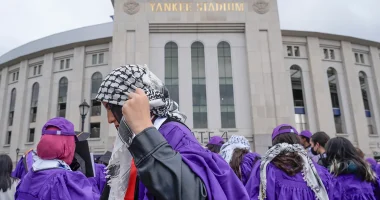Unlock the Editor’s Digest for free
For the past year, the Chinese government has been trying to encourage overseas visitors to return to China. Last month, it took the unusual step of insisting that hotels stop turning them away.
Foreigners are rarely rejected from hotels in China’s biggest cities. Outside them, however, it remains a lingering risk. While making a recent visit to Changsha, the provincial capital of Hunan, it happened to me.
In most cases, a hotel will claim that it lacks the relevant qualification to accept overseas guests. The central government’s notice specifically prohibits hotels from rejecting visitors on such grounds. So what explains the practice?
Part of the answer lies in China’s history. The country introduced measures for “control of security in the hotel industry” in 1987, at a time when it was reopening to the world. These require that details of overseas guests are submitted to authorities.
Ken Jarrett, a former US consul-general in Shanghai, arrived in 1979 when there were limitations on where foreigners could stay. He recalls having to ask for a “foreigners’ hotel”, as well as crowds of Chinese people gathered outside the famous Peace Hotel in Shanghai trying to figure out what was going on inside.
One explanation for the current rejection of overseas guests is the residual memory of that set-up, even if it is hard to identify any definitive sign of specific qualifications required. Zhao Huanyan, a senior economist in the tourism and hospitality industry, says that hotels cite the purported qualification as an “excuse”, and that the reality is that they may lack the training or language skills to accept foreigners.
Based on the 1980s government regulations, hotels must still scan the identification documents of foreign visitors when they check in. The information is passed on to the local Public Security Bureau (PSB). In post-Maoist China, the political climate would have been highly attuned to any foreign presence. Political tensions with the US may explain the persistence of such practices.
Chinese identification documents need to be registered at hotels, too, and staff say these details are also sent to the PSB. In some regions, such as Hunan, the local version of regulations confirm this. The PSB fines hotels if they input information incorrectly. Foreigners, having distinct documentation, may therefore be an administrative risk for hotels rather than a target for discrimination (though there are accounts of this occurring during the Covid-19 pandemic).
China’s habit of closely tracking guests extends far beyond the recent communist past. Over two millennia ago in Qin dynasty China, Shang Yang, a reformer who advocated harsh rules, wanted to stay at an inn while on the run after his political fortunes changed. The innkeeper, citing the fugitive’s own rules, said he could only stay if he registered his true name. “Oh my legislation,” he lamented. “The law has been corrupted.” He was subsequently torn apart by chariots.
In recent decades, Chinese hotels have emerged as a core component of local infrastructure, closely enmeshed with government and often built on a vast scale. In a country where citizens in living memory required a letter from the head of their work unit to travel, they are an important part of the state’s security apparatus — a leviathan that only rarely surfaces for air.
Foreigner rejections may simply be an unintended consequence of that domestic apparatus. But it is hard to entirely discount the possibility that behind the scenes, local authorities are intervening to constrain certain establishments. The history of China may help to shed light on the origins of foreigner rejections from hotels, but the system it has produced makes it difficult to be certain of the precise cause.
Back in Shanghai, I popped into a boutique hotel to double check they would accept friends visiting from overseas. The answer was yes. The receptionist was under the impression that hotels rejecting guests lacked the right qualification. But she was not sure of the credentials in question, or the exact details of the rules. “There are so many departments,” she said, gesturing around her. “There’s definitely someone who knows.”
Additional reporting by Wenjie Ding in Beijing
thomas.hale@ft.com
Also Read More: World News | Entertainment News | Celeb News









